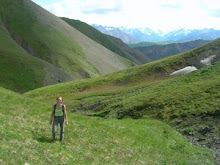Rose-Anne, my co-conspirator in tandem blogging, visited me here in Chicago last week. Our relationship has always been defined by food—my god, the cookies we’ve baked—and by conversation, and this visit after eight months of long-distance friendship was no different. We ate braised fennel and almond-crust pizza and oatmeal cookies sandwiching rum raisin ice cream; we petted my cats, and Rose-Anne met my two partners, and generally I think we both came away with a new dimension added to our friendship. While she was here, we also decided on our next tandem topic, and I surprised myself with my suggestion: things we take for granted. (You can read Rose-Anne's take here.)
The thing is, I spend a lot of time trying not to take things for granted. I try to pay attention to the small moments, the tiny details that would pass me by if I weren’t making an effort to see them, the stuff that can be easily overlooked. Why, then, was I compelled to suggest this? And anyway, what does it mean to take something for granted? Does it mean that we don’t see it, that we don’t think about it, that we do think about it but consider it inevitable instead of capable of change? In the end, for me it came down to this: I think that in the same way you can listen to somebody without hearing them you can also look at things without seeing them, and this is when you begin to take them for granted. They’re there, and on some level you know that, but they are so far below your degree of engagement that they might as well not be. The things we take for granted are our blind spots.
Really, if I take anything for granted, it is the big picture. The wide view, the burst of motion that moves you somewhere else, the flurry: I am, relatively speaking, mostly oblivious. I’m examining the sidewalk cracks while traffic moves around me, fascinated by a person’s facial expressions while I should be noticing that they’re flirting with me; I’m more likely to see the graffiti on a building than the building itself. When I think about my life now, I tend to think of it as a series of miniatures: a tiny movement here, a singular moment there, an isolated phrase within a larger conversation. This flower, that footstep. I hadn’t realized how insular my world was becoming; not that seeing small things closes me off—if anything, it brings me closer to the present—but that in my quest for nuance I had mostly stopped seeing larger things.
This all came to a head last weekend, when I was trying and failing miserably to find the Evanston farmer’s market. I walked around the small downtown, wheeling my bike and becoming more and more frustrated because goddamn did I ever want some rhubarb, and after all these years shouldn’t I know my way around downtown Evanston? Jeez. But in addition to being rather spatially inept, I also don’t often see buildings; I see the flowers in front of them, and the people coming out of them, but the actual structures themselves slide past my eyes without leaving much detailed evidence of their existence. And so when I was faced with finding the freaking Evanston Hyatt, which I have been to and by many times, I had to call a friend to ask for directions. Oh, the shame.
But beyond not being able to find hotels that house farmer’s market full of rhubarb and raw honey and asparagus, I wonder if my attention to detail has been giving me tunnel vision in other ways. As I’ve been struggling with my recent backslide into a less happy place than I believe I deserve to be in, I wonder if it’s partially because I’ve become mired in sidewalk cracks instead of opening myself up in order to soar and see things from a different perspective. “Intent gets blocked by noise,” Marge Piercy says, and even though I love the noise maybe sometimes I need to stretch past that to the next level. I started looking down at the ground because I wanted to see the things other people were missing, but maybe I’ve been missing out a bit myself.
I’ve pointed out more than once that in natural settings--I don't know about urban settings, although I'd be interested to see if this holds true--adults tend to see panoramas while children see smaller objects closer to themselves in scope, but I think you need a bit of both for a more balanced view. Besides, who wants to be only an adult or only a child? The minute details are not all there is; the broad strokes of my life also have the potential for beauty. I can’t pay attention to everything, but I don’t have to pre-define the scope of what I choose to see either. Mountains and grass, conversations and graffiti: I want it all.
When I was little I wanted to live life full-tilt, like Teddy Roosevelt. Now, I just I want to live life with my eyes open. I think it's better this way.
Subscribe to:
Post Comments (Atom)







No comments:
Post a Comment